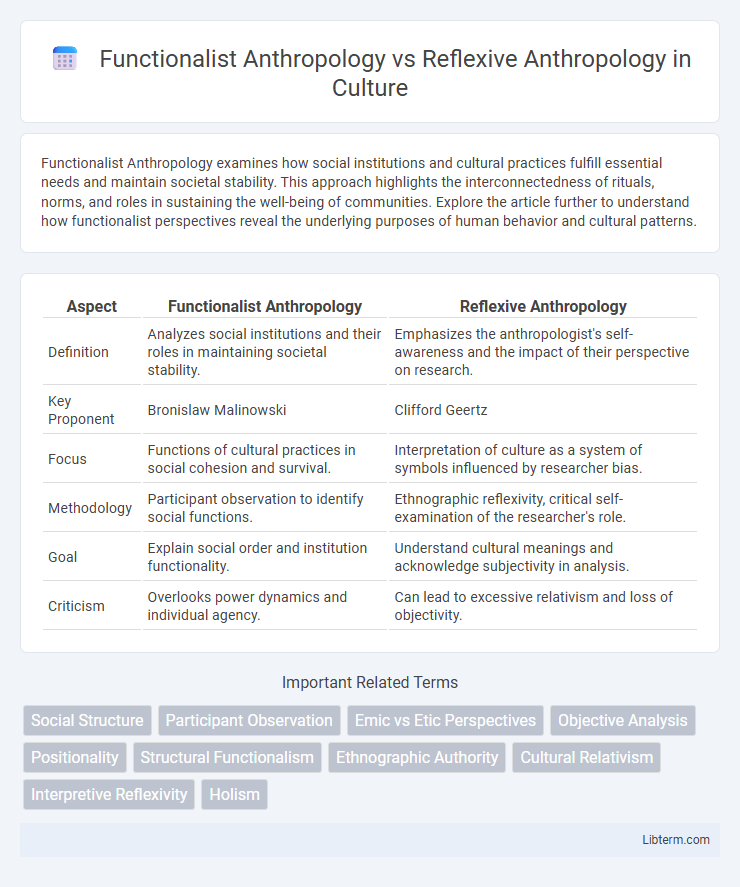Functionalist Anthropology examines how social institutions and cultural practices fulfill essential needs and maintain societal stability. This approach highlights the interconnectedness of rituals, norms, and roles in sustaining the well-being of communities. Explore the article further to understand how functionalist perspectives reveal the underlying purposes of human behavior and cultural patterns.
Table of Comparison
| Aspect | Functionalist Anthropology | Reflexive Anthropology |
|---|---|---|
| Definition | Analyzes social institutions and their roles in maintaining societal stability. | Emphasizes the anthropologist's self-awareness and the impact of their perspective on research. |
| Key Proponent | Bronislaw Malinowski | Clifford Geertz |
| Focus | Functions of cultural practices in social cohesion and survival. | Interpretation of culture as a system of symbols influenced by researcher bias. |
| Methodology | Participant observation to identify social functions. | Ethnographic reflexivity, critical self-examination of the researcher's role. |
| Goal | Explain social order and institution functionality. | Understand cultural meanings and acknowledge subjectivity in analysis. |
| Criticism | Overlooks power dynamics and individual agency. | Can lead to excessive relativism and loss of objectivity. |
Introduction to Functionalist and Reflexive Anthropology
Functionalist anthropology examines social institutions and cultural practices based on their roles in maintaining societal stability and functionality, emphasizing systemic interrelations and collective norms. Reflexive anthropology critiques this approach by highlighting the researcher's influence, power dynamics, and the subjective nature of ethnographic knowledge, promoting self-awareness and ethical responsibility in the study. The contrast between these perspectives shapes contemporary anthropological methodologies, balancing structural analysis with interpretive depth.
Historical Background and Key Proponents
Functionalist Anthropology emerged in the early 20th century, primarily shaped by Bronislaw Malinowski and A.R. Radcliffe-Brown, emphasizing the role of social institutions in maintaining societal stability. Reflexive Anthropology developed later, gaining prominence in the 1980s through figures like Clifford Geertz and James Clifford, focusing on the ethnographer's subjective experience and the interpretive nature of cultural analysis. These approaches reflect a shift from analyzing social functions to critically examining the researcher's influence on anthropological knowledge.
Core Principles of Functionalist Anthropology
Functionalist Anthropology centers on understanding social institutions and cultural practices based on their roles in maintaining societal stability and functioning. It emphasizes that every element of society serves a specific purpose that contributes to the overall cohesion and equilibrium of the social system. Key proponents like Bronislaw Malinowski and A.R. Radcliffe-Brown highlight the interdependence of social structures and their functions in meeting the basic needs of individuals and communities.
Central Tenets of Reflexive Anthropology
Reflexive Anthropology emphasizes the importance of self-awareness and critical reflection by anthropologists on their own biases, social positions, and impact on the research process, challenging the objectivity assumed in Functionalist Anthropology. It advocates for acknowledging the power dynamics between researcher and subjects, promoting collaboration and ethical sensitivity in ethnographic work. This approach prioritizes understanding cultural contexts through a dialogic process rather than treating societies as static systems fulfilling social functions.
Research Methodologies Compared
Functionalist anthropology employs systematic fieldwork and participant observation to analyze how social institutions maintain societal stability, emphasizing objective data collection and structural function. Reflexive anthropology incorporates self-critique and ethnographer's positionality, using introspective methodologies and collaborative dialogue to uncover the subjective influence on data interpretation. Both approaches utilize ethnography, but functionalism prioritizes explanatory models of social order, while reflexivity foregrounds the researcher's impact on knowledge production and representation.
Approaches to Culture and Social Structure
Functionalist Anthropology interprets culture and social structure as interconnected systems where each element serves a purpose to maintain societal stability and cohesion. Reflexive Anthropology challenges this view by emphasizing the subjective experiences and interpretations of individuals within cultures, highlighting the fluidity and contingency of social structures. The former relies on objective, systemic analysis, while the latter focuses on critical self-awareness and the co-construction of knowledge between anthropologist and subjects.
Role of the Anthropologist: Observer vs Participant
Functionalist anthropology emphasizes the anthropologist as an objective observer analyzing societal institutions and their roles in maintaining social stability. In contrast, reflexive anthropology highlights the anthropologist as a participant who critically examines their own influence on the research process and acknowledges subjectivity. This shift impacts data interpretation, with reflexive anthropologists focusing on power dynamics and ethical considerations within fieldwork.
Criticisms and Limitations of Each Perspective
Functionalist Anthropology faces criticism for its tendency to oversimplify complex social systems by emphasizing stability and cohesion while neglecting conflict and individual agency. Reflexive Anthropology is limited by its potential for excessive subjectivity, as researchers' personal biases and positionality can influence ethnographic interpretations. Both perspectives struggle to fully capture the dynamic interplay between structure and agency in cultural analysis.
Influence on Contemporary Anthropological Theory
Functionalist Anthropology emphasizes the role of social institutions in maintaining societal stability and cohesion, shaping contemporary structural-functional approaches in anthropology. Reflexive Anthropology critiques the researcher's influence on ethnographic representation, promoting self-awareness and ethical accountability in fieldwork methods. Together, these paradigms significantly influence current anthropological theory by balancing objective structural analysis with subjective interpretive insights.
Conclusion: Relevance and Future Directions
Functionalist Anthropology emphasizes social structures and their roles in maintaining societal stability, while Reflexive Anthropology critiques this by highlighting the importance of researcher subjectivity and power dynamics. The future direction lies in integrating the systematic analysis of social functions with reflexive methodologies to deepen understanding of culture and power relations. Embracing this synthesis can enhance ethnographic relevance in addressing contemporary social complexities and global interconnectedness.
Functionalist Anthropology Infographic

 libterm.com
libterm.com